- Home
- Quizzes
- My Quiz Activity
- Newsletters
- Sports Betting
- MY FAVORITES
- Add Sports/Teams
- SPORTS
-
NFL
- NFL Home
- Arizona Cardinals
- Atlanta Falcons
- Baltimore Ravens
- Buffalo Bills
- Carolina Panthers
- Chicago Bears
- Cincinnati Bengals
- Cleveland Browns
- Dallas Cowboys
- Denver Broncos
- Detroit Lions
- Green Bay Packers
- Houston Texans
- Indianapolis Colts
- Jacksonville Jaguars
- Kansas City Chiefs
- Las Vegas Raiders
- Los Angeles Chargers
- Los Angeles Rams
- Miami Dolphins
- Minnesota Vikings
- New England Patriots
- New Orleans Saints
- New York Jets
- New York Giants
- Philadelphia Eagles
- Pittsburgh Steelers
- San Francisco 49ers
- Seattle Seahawks
- Tampa Bay Buccaneers
- Tennessee Titans
- Washington Commanders
-
MLB
- MLB Home
- Arizona Diamondbacks
- Atlanta Braves
- Baltimore Orioles
- Boston Red Sox
- Chicago White Sox
- Chicago Cubs
- Cincinnati Reds
- Cleveland Guardians
- Colorado Rockies
- Detroit Tigers
- Houston Astros
- Kansas City Royals
- Los Angeles Angels
- Los Angeles Dodgers
- Miami Marlins
- Milwaukee Brewers
- Minnesota Twins
- New York Yankees
- New York Mets
- Oakland Athletics
- Philadelphia Phillies
- Pittsburgh Pirates
- San Diego Padres
- San Francisco Giants
- Seattle Mariners
- St. Louis Cardinals
- Tampa Bay Rays
- Texas Rangers
- Toronto Blue Jays
- Washington Nationals
-
NBA
- NBA Home
- Atlanta Hawks
- Boston Celtics
- Brooklyn Nets
- Charlotte Hornets
- Chicago Bulls
- Cleveland Cavaliers
- Dallas Mavericks
- Denver Nuggets
- Detroit Pistons
- Golden State Warriors
- Houston Rockets
- Indiana Pacers
- Los Angeles Clippers
- Los Angeles Lakers
- Memphis Grizzlies
- Miami Heat
- Milwaukee Bucks
- Minnesota Timberwolves
- New Orleans Pelicans
- New York Knicks
- Oklahoma City Thunder
- Orlando Magic
- Philadelphia 76ers
- Phoenix Suns
- Portland Trail Blazers
- Sacramento Kings
- San Antonio Spurs
- Toronto Raptors
- Utah Jazz
- Washington Wizards
-
NHL
- NHL Home
- Anaheim Ducks
- Arizona Coyotes
- Boston Bruins
- Buffalo Sabres
- Calgary Flames
- Carolina Hurricanes
- Chicago Blackhawks
- Colorado Avalanche
- Columbus Blue Jackets
- Dallas Stars
- Detroit Red Wings
- Edmonton Oilers
- Florida Panthers
- Los Angeles Kings
- Minnesota Wild
- Montreal Canadiens
- Nashville Predators
- New Jersey Devils
- New York Islanders
- New York Rangers
- Ottawa Senators
- Philadelphia Flyers
- Pittsburgh Penguins
- San Jose Sharks
- Seattle Kraken
- St. Louis Blues
- Tampa Bay Lightning
- Toronto Maple Leafs
- Vancouver Canucks
- Vegas Golden Knights
- Washington Capitals
- Winnipeg Jets
- NCAAF
- NCAAM
- Boxing
- Entertainment
- Lifestyle
- Golf
- MMA
- Soccer
- Tennis
- Wrestling
- More Sports
- RESOURCES
- My Account
- YB on Facebook
- YB on Twitter
- YB on Flipboard
- Contact Us
- Privacy Policy
- Terms of Service
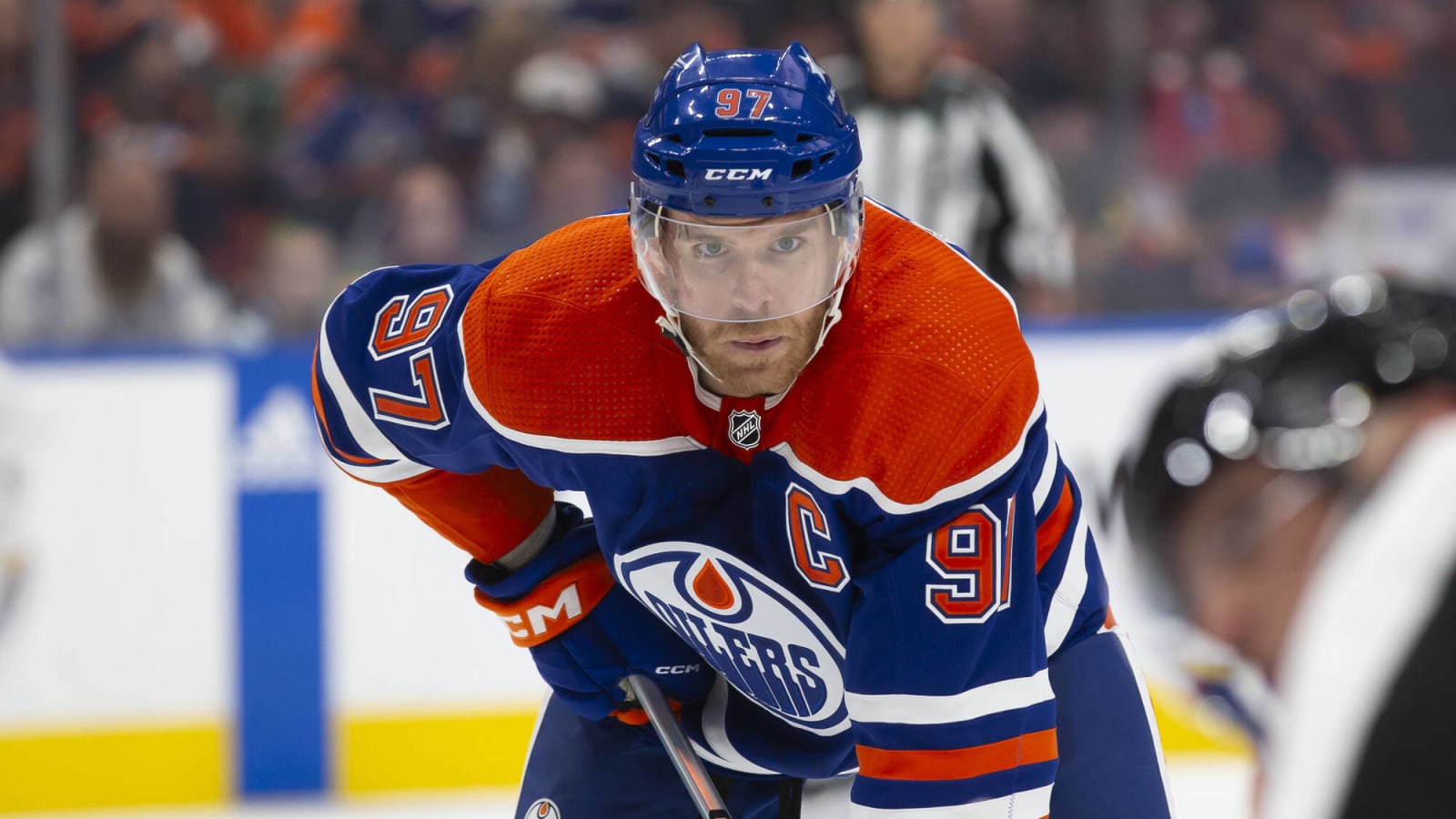
Every Hart Trophy winner of the NHL's Expansion Era
The NHL has a way with trophies. It’s not just the Stanley Cup. The MVP of NHL doesn’t merely win the “MVP trophy.” No, they take home the Hart Trophy, or officially the Hart Memorial Trophy. Here is every winner of the Hart since the 1967-68 season, the beginning of the “Expansion Era” of the NHL, when the league doubled from six teams to 12. Now, there are a lot of repeat winners in the mix, but each season is unique like a snowflake, so they are all worth looking into.
1967-68: Stan Mikita

The addition of six new teams to the NHL did not stand in the way of Stan Mikita, who won his second of back-to-back Harts in 1968. The Chicago legend actually predated the surge of Eastern European players that hit the NHL as the Iron Curtain began to disintegrate, as he was Slovakian by birth and adopted by his aunt and uncle in Canada when he was eight. Mikita scored 40 goals, a personal high, in winning his second MVP. It paved the way to his donut spot in “Wayne’s World.”
1968-69: Phil Esposito
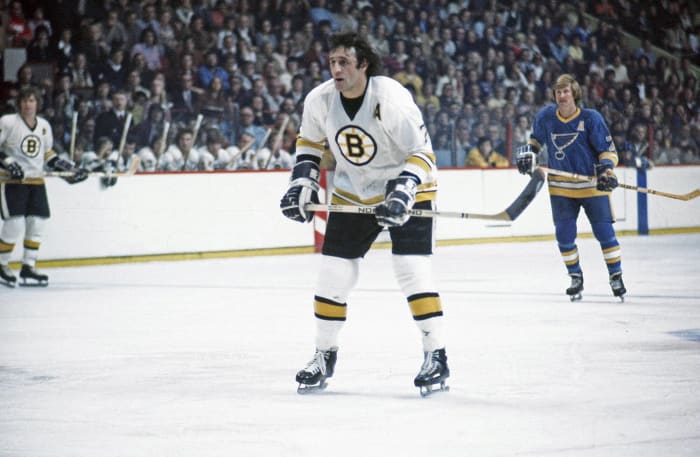
“Espo” had been a teammate of Mikita’s in Chicago, but it is with Boston that he became a legend. In 1969 he won his first Art Ross and also his first Hart. His 49 goals didn’t lead the NHL, but his 77 assists and 126 points did. Esposito brought the Hart to Boston for the first time since the early 1950s.
1969-70: Bobby Orr

As a rookie, Orr took home the Calder, and Norris winner Harry Howell famously quipped he was glad he won it before Orr would “own” the trophy. Indeed, Orr would go ahead and win…eight Norris trophies in a row. Yeah, he changed the NHL. Part of his change of the landscape is when he won not only the Hart, but the Art Ross in 1970. Orr managed a staggering 120 points, massive for a forward, much less a defenseman.
1970-71: Bobby Orr

After winning his first Hart and adding to his Norris collection, Orr went back to back. This time, Orr didn’t win the Art Ross, but he improved his point total. As a defenseman, mind you, Orr scored 37 goals, and also added 102 assists. That’s absolutely staggering.
1971-72: Bobby Orr

This is Orr’s third, and final, Hart. He would win an Art Ross later in his career, but the Hart didn’t come to him that year. The Bruins legend, and the greatest defenseman of all time, had 117 points. However, it’s his 24 power-play points that stand out more, as they paved the way to his second Conn Smythe.
1972-73: Bobby Clarke

It took a few years, but finally a player from one of the Expansion Six won the Hart. Fittingly, it’s the guy who was the face of a Flyers franchise who would also become the first of the expansion squads to lift the Cup. That would come in the next season, though. First, Clarke broke through with his Hart thanks to a campaign that saw him score a personal high of 37 goals while adding 67 assists.
1973-74: Phil Esposito

Clarke and the Flyers won the Cup in 1974, but Esposito got his second Hart. This was his fourth Art Ross in a row, and his fifth of six straight seasons leading in goals. Espo’s 68 goals (the dude is a little forgotten as an incredible goal scorer, even if it was easier to do back in the ‘70s) paved the way for his second, and final, MVP.
1974-75: Bobby Clarke
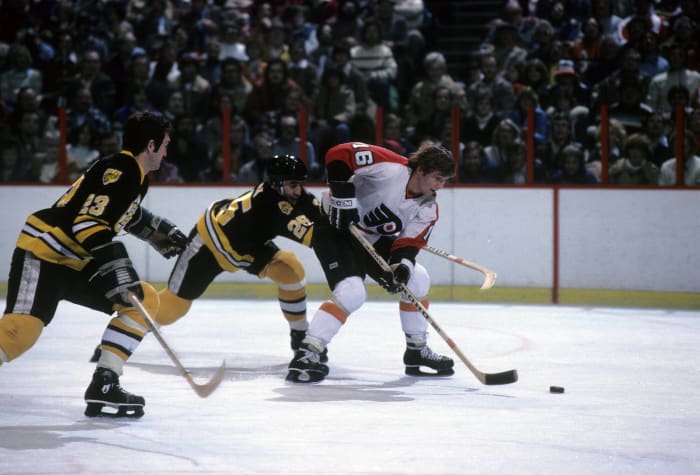
This time, Clarke got to pull the double. He won the Hart, and then the Flyers won their second of back-to-back Cups. While he wouldn’t win the Conn Smythe either time Philly hoisted the Cup, his 89 assists helped him to 116 points. He played some quality defensive center as well, as in 1983 he would take home a Selke.
1975-76: Bobby Clarke

If two out of three ain’t bad, three out of four is something special. Clarke took home his third, and final, Hart by improving his offensive totals just a smidge. Once again, he had 89 assists, but this time he had 30 goals instead of 27, and that’s a nice, round number for a center to hit.
1976-77: Guy Lafleur

The Canadiens have so many legends that Lafleur sometimes gets overlooked. Maybe he didn’t have the force of personality like Maurice Richard, but the dude was the first NHL player to score 50 goals in six straight seasons. The 1976-77 campaign was his crowning achievement. In 1976, he had won the Art Ross, but lost the Hart to Clarke. This time, he got the Art Ross, the Hart, and also the Conn Smythe when the Canadiens hoisted the Cup.
1977-78: Guy Lafleur
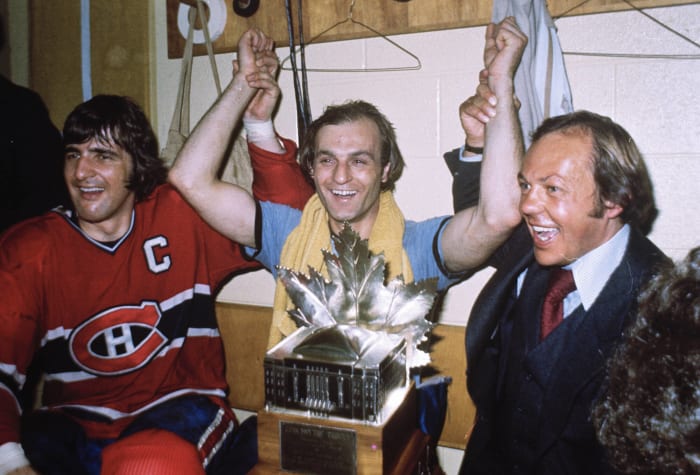
Lafleur repeated in 1978. His points dropped from 136 to 132, though he still led the league. However, his goals increased from 56 to 60. He would also help Montreal win the Cup once more, one of five he won with the team.
1978-79: Bryan Trottier

Mike Bossy? Never won a Hart. Denis Potvin? Nope. Those two are Islanders legends, just like Trottier, but Trottier is the one who won an MVP. He did it in 1979, right before the Islanders went on their four-season run of winning the title, a true dynasty. Trottier had 134 points, winning his one and only Art Ross. Then, well, a force hit the NHL that changed the landscape for a bit.
1979-80: Wayne Gretzky

We are going to have to mete out a lot of Gretzky facts on this list, so let’s start with the interesting beginning to his pro career. As a 17-year-old, he was signed by the WHA’s Indianapolis Racers, even though the Racers’ owner knew the team was about to fold. It was felt Gretzky was a future star, and maybe the Racers’ brass could get a little cash when the young star moved on. Indeed, the Racers quickly moved Gretzky to the Oilers, which arguably helped push the NHL’s ownership board to accept four WHA franchises into the fold before the 1979-80 season, one of them Edmonton. The NHL also changed some rules around to allow the Oilers to keep Gretzky on their roster. Anyway, in his age-18 season, making his NHL debut, Gretzky scored 51 goals, added 86 assists, and won the Hart.
1980-81: Wayne Gretzky

This was the first of seven Art Ross trophies in a row Gretzky won. His team wasn’t quite ready to win the Cup yet in 1980-81, but you can’t blame “The Great One.” This time around he had 55 goals and 109 assists. He added 21 points in nine playoff games. Like we said, can’t blame Gretzky the Oilers didn’t win the Cup!
1981-82: Wayne Gretzky

There is a chance Alex Ovechkin will break Gretzky’s record of 894 career goals. Now, he won’t get anywhere near the 2,857 points Gretzky put up. Jaromir Jagr is second all time in points, and he finished with 1,921 while playing until he was, roughly speaking, 85 years old. If Ovi overtakes Gretzky, that will be incredible. A record that once seemed insurmountable will have been beaten. That being said, in the 1981-82 season Gretzky scored 92 goals. Now that is a record that will stand forever.
1982-83: Wayne Gretzky

Gretzky started his NHL career four-for-four in winning MVP. He notched 71 goals and had 196 points... and that qualified as a step down from the season prior. When you watch clips of the NHL in the era, especially goalies, you recognize that scoring was obviously easier then. However, Gretzky made it look simple when he was with the Oilers. That’s taking things to a different level.
1983-84: Wayne Gretzky

Finally, Gretzky and the Oilers reached the ultimate team goal. While “The Great One” took home his fifth Hart in a row, he also lifted the Cup with the Oilers. This was Edmonton’s first title. Maybe when we fret about a young star not yet having won it all, in any sport, we should remember Gretzky won four MVPs before he won a Cup in his fifth season.
1984-85: Wayne Gretzky

Gretzky had 208 points during the regular season in winning his sixth Hart, but let’s turn to the playoffs. Here, Gretzky set another record. The Oilers won the Cup, and Gretzky had 47 points in 18 playoff games. Nobody has ever had more than that, and it would be wild if anybody did. Let’s say your team played the maximum number of games in a postseason, which is 28. You’d have to average 1.68 points per contest to tie Gretzky’s record.
1985-86: Wayne Gretzky

There would be no Cup for the Oilers in the 1985-86 season, so Gretzky had to go and set some records to keep himself occupied. His 163 assists? That’s a record. His 215 points? Also a record. Neither of those will ever be beaten.
1986-87: Wayne Gretzky

Eight Hart trophies in a row. Gretzky was MVP of the NHL in each of his first eight seasons. That is hard to wrap your head around. He had 62 goals and 121 assists in taking home that eighth Hart, and the Oilers would win another Cup.
1987-88: Mario Lemieux

So in the 1987-88 season Gretzky… wait, what? Somebody else won the MVP? Indeed! In a way we kind of feel bad for Lemieux. He is one of the five best NHL players of all time, but he’s the second-best player of his own generation. This year, Gretzky was limited to 64 games due to injury, and Lemieux stepped up and won the Hart. “Super Mario” led the NHL with 70 goals and 168 points. However, his Penguins did not make the playoffs, while Gretzky’s Oilers won their fourth.
1988-89: Wayne Gretzky

Don’t worry, this is Gretzky’s final Hart, but it’s also different! This was his first season with the Kings. If we’re being honest, Lemieux should have won again. He had 85 goals and 199 points. Gretzky had 58 goals and 168 points. However, Gretzky had moved to a new team and made Los Angeles the epicenter of hockey. That helped him win his final Hart, more than likely.
1989-90: Mark Messier

You think Lemieux had it tough? Messier is third in career points, and he spent a good portion of his career as the second-best player on his own team! However, when Gretzky moved on to LA, “Moose” proved he was not merely a product of playing with “The Great One.” In the 1989-90 season, Messier won the Hart with 129 points, and then also led the Oilers to their one Cup to date after Gretzky left.
1990-91: Brett Hull

By the NHL’s historical record keeping, Hull is the first non-Canadian to win the Hart. Of course, as we noted earlier, Mikita was born in the then-Slovak Republic, and a couple other guys raised in Canada were born elsewhere. Hull, meanwhile, was born in Canada but is considered American (and he did play for the U.S. at the Olympics). Anyway, Hull scored 86 goals for the Blues which, yeah, that’ll win you a Hart.
1991-92: Mark Messier
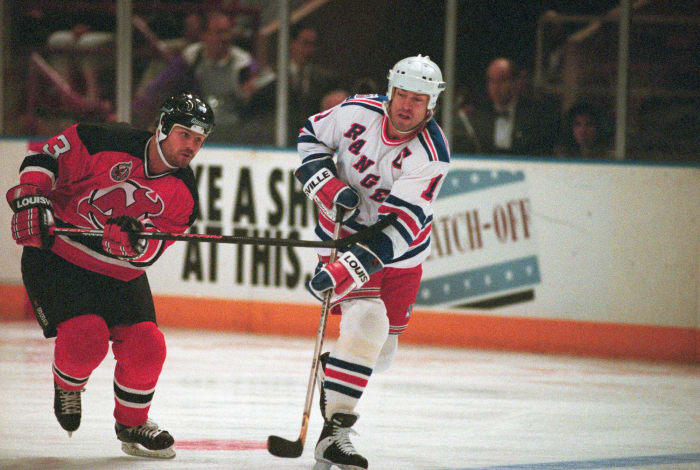
Much like Gretzky, Messier would leave Edmonton and win a Hart elsewhere. This time, he won with the Rangers. Like his former teammate, Messier was in his first season with his new team. Hmm… did that influence voters? Of course, Messier had 35 goals and 72 assists as scoring in the NHL started to become less bananas, which certainly helped.
1992-93: Mario Lemieux

Okay, so maybe if you were Mario Lemieux, NHL scoring did not dip in the mid-‘90s. He had 69 goals and 91 assists in the 1992-93 season, which won him the Hart. Oh, and he did that in 60 games. That is… staggering.
1993-94: Sergei Fedorov
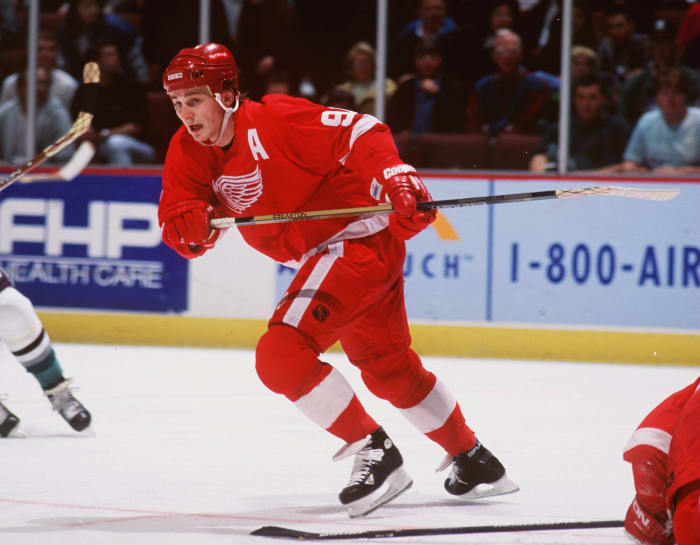
Steve Yzerman was the face of the Red Wings for two decades. Seriously, he was the captain in Detroit for 19 seasons. However, Stevie Y never won a Hart. His flashy Russian teammate Fedorov, though, did win the MVP once. He had 56 goals and 120 points, both personal bests for the future Hall of Famer and key member of the Red Wings’ iconic “Russian Five.”
1994-95: Eric Lindros

The 1994-95 campaign was the lockout-shortened season. Well, the first one. Lindros won his one and only Hart that year, tallying 70 points in 46 games with the Flyers. Once upon a time, Lindros’ reputation was fraught. He did force his way out of Quebec before ever playing a game, but his issues with injuries, and specifically concussions, are no longer frowned upon or considered a mark against him. The Hall of Famer finished his career with 865 points in 760 games.
1995-96: Mario Lemieux

Lemieux had sat out the lockout season as he dealt with the fallout of cancer treatment. When he returned to the Penguins for the 1995-96 season, he looked no worse for the wear. His 69 goals and 92 assists in 70 games both led the NHL. This would be his final Hart.
1996-97: Dominik Hasek

Oh yeah, goalies exist! Hasek was not the first goalie to win the Hart, but he was the first to do it since 1962 when Jacques Plante took it home. The Czech goalie basically made the Sabres a contending team solely on the strength of his incredible, unorthodox goaltending. He posted a 2.27 GAA and .930 save percentage. Yes, he also won the Vezina.
1997-98: Dominik Hasek

Hasek did make history when he became the first, and to date only, goalie to win more than one MVP award. He was even better in the 1997-98 season. Hasek played in 72 games, unheard of by modern standards, and put up a 2.09 GAA and .932 save percentage with a staggering 13 shutouts. This was Dom’s last Hart, but he would win two more Vezinas after this. Also, he won two before he won his first Hart. Truly a legend in net.
1998-99: Jaromir Jagr

Though he has the second-most points of all time, and is a legend of the game, this is Jagr’s only MVP. Still a Penguin at the time (this was before Jagr ended up playing for another half-dozen or so teams, plus his stint in the KHL), Jagr also won the Art Ross with his 127 points. Maybe he only won one Hart, he did lead the NHL in points five times.
1999-2000: Chris Pronger

Pronger is the first defenseman to win the Hart since Orr, and to date he is the last defenseman to do so. The first winner of the Hart in the new millennium, Pronger had 14 goals and 48 assists for the Blues. While Pronger would take a few too many penalties — and be suspended eight times in his career — he still made it to the Hall of Fame and is one of the best defensemen of his era.
2000-01: Joe Sakic
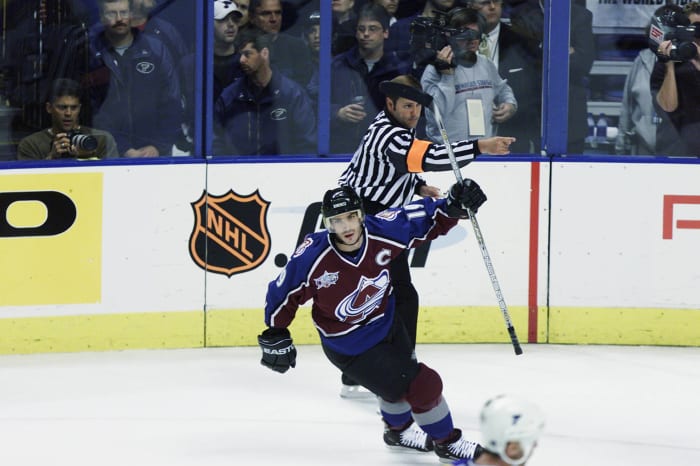
Sakic is the foremost face of the Colorado Avalanche. Of course, there were years with the Nordiques in the mix there as well, but he was the captain of the team when it moved cities, and he remained captain until he retired in 2009. In 1996, Sakic won the Conn Smythe as playoffs MVP, but in 2001 he added the Hart to his hardware. He had 118 points for the Avalanche, who also won the Cup that year.
2001-02: Jose Theodore

As of this writing, Jagr isn’t in the Hall of Fame, but only because he played so long he is not yet eligible. Theodore is the first Hart winner on this list who is pretty clearly not going to make it to the Hall (two pre-expansion players to win the Hart are not in the Hall as well). In a surprise turn of events, the Canadiens goalie posted a 2.11 GAA and .931 save percentage in 67 appearances. Theodore won his only Vezina, his only Hart and made his first of two All-Star Games.
2002-03: Peter Forsberg

The Avalanche won two Harts in three seasons, but different players did it. Forsberg was on a postage stamp in Sweden before he was even an NHL star. He actually had missed the entire 2001-02 regular season recovering from having his spleen removed (yeesh!) but returned for the playoffs and had 27 points in 20 games. The next year he had 106 points and won the MVP. It was the injury-prone player’s last great campaign.
2003-04: Martin St. Louis

Scoring in the new millennium is indicative of how much the trap and clutching and grabbing had come to negatively impact the NHL. Three times in five seasons the Art Ross winner had fewer than 100 points, which had not happened in a full season since the 1967-68 campaign. St. Louis tallied 94 points with the Lightning, which is the second-lowest total in a full season since NHL expansion. The next year, the entire NHL season was canceled due to the lockout. Bad times for the league.
2005-06: Joe Thornton

The NHL returned from the lockout for the 2005-06 season. History was made when Thornton won the Hart. He is, to date, the only player to win the Hart in a season where he was traded. The future Hall of Famer had 33 points in 23 games with the Bruins, but he was then traded to the Sharks. He added 92 points in 58 games with San Jose, which helped push the center to an unprecedented Hart victory.
2006-07: Sidney Crosby

Returning from canceling an entire season is hard for a league. The NHL bet on a couple of things in terms of getting fans back invested. One was changing the rules to try and improve scoring. The other was betting on the dynamic young duo of Crosby and Alex Ovechkin. Ovechkin won the Calder, but Crosby got to the Hart first. In only his second season, “Sid the Kid” led the NHL with 120 points and got the Penguins back to the playoffs.
2007-08: Alex Ovechkin

Speaking of Ovechkin, he didn’t take long adding a Hart to his resume as well. Perhaps the greatest goal scorer of all time, Ovechkin helped show the NHL was indeed bringing back scoring in a big way. He tallied 65 goals to lead the league. This was the first time anybody had hit the 60-goal mark since Lemieux did it in the 1995-96 season.
2008-09: Alex Ovechkin

Back-to-back Harts for Ovechkin. This time, there was quite the battle between Crosby and his Russian counterpart in Washington. Both had over 100 points, though neither won the Art Ross (Crosby’s teammate Evgeni Malkin did). However, Ovechkin led the NHL with 56 goals, and that helped him pick up another MVP.
2009-10: Henrik Sedin

The last few winners are all future Hall of Famers, but Sedin retired early enough that he’s already in the Hall. Henrik and his twin Daniel had an odd career. They were both drafted by the Canucks in 1999, Daniel going second and Henrik going third. They both spent their entire career in Vancouver, and they retired the same day. Henrik, the center of the two, won the Art Ross with 112 points, including 83 assists.
2010-11: Corey Perry

In the 2010-11 season, Henrik’s brother Daniel won the Art Ross himself. Daniel had 41 goals and 63 assists for the Canucks. Maybe Henrik was getting a lot of the credit, though. Or, perhaps, the voters just preferred goal scoring. Perry had 98 points, but he led the NHL with 50 goals, so the Duck took home the Hart. He’s a fringe Hall candidate, so it will be interesting to see if Perry joins the list of Hart winners never to make the Hall.
2011-12: Evgeni Malkin
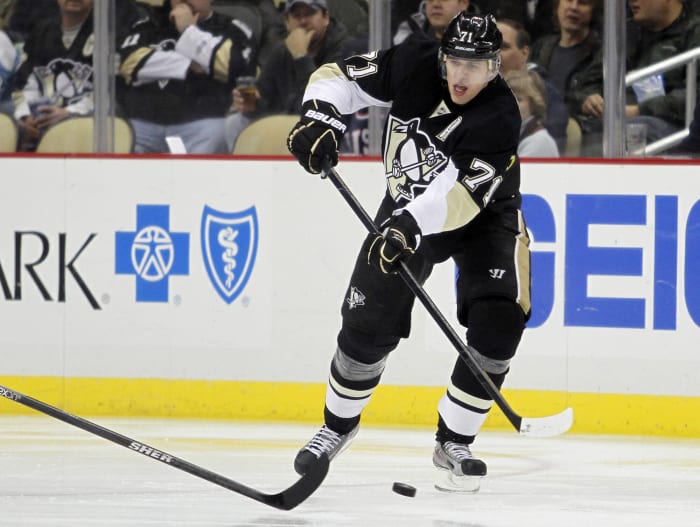
With Sidney Crosby dealing with post-concussion fallout during the 2011-12 season (fortunately not something that became a recurring issue for the star), Malkin had to step up and lead the Penguins’ offense. Hey, he had won the Art Ross before. We knew he could do it. Indeed, Malkin won his second Art Ross with 109 points. The Russian was the only NHL player to hit the 100-point mark, which won him the Hart this time.
2012-13: Alex Ovechkin

Ovechkin’s third MVP put him in rarified air. Only nine players have won at least three Hart trophies, with three of those players winning them all before the Expansion Era began. The 2012-13 season was limited to 48 games due to another lockout, so Ovi won the award with 32 goals and 56 points.
2013-14: Sidney Crosby

Crosby has more Cups, and more Conn Smythes, but he’s one Hart behind Ovechkin, and likely always will be. After a few seasons struggling with injuries, Crosby played 80 games, and he made them count. The Penguins legend led the NHL with 68 assists and 104 points, and voters happily gave a healthy Crosby the Hart.
2014-15: Carey Price

Price may get in the Hall of Fame. He played his entire career with the Canadiens and has something of a cult surrounding him built mostly on his playoff success. That being said, he was stellar in the 2014-15 season in winning his only Vezina to go with the Hart. Price led the NHL with 44 wins, but also with an 1.96 GAA and .933 save percentage for good measure.
2015-16: Patrick Kane
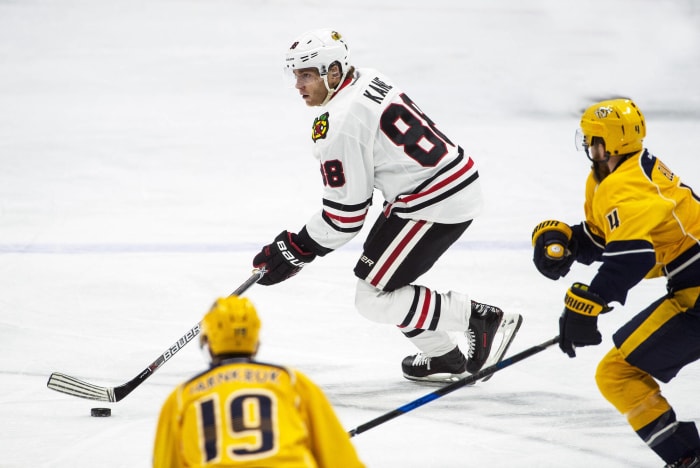
During the Blackhawks dynasty, the team didn’t win many individual awards, but Kane did make it happen. He took home the one Art Ross and the one Hart the team won in that time. Kane had 46 goals, a career high, and finished with 106 points. This was after the Cup-winning era for Chicago, so this was that dynasty’s last hurrah in some ways.
2016-17: Connor McDavid

McDavid entered the NHL the most-hyped prospect since Crosby. While an injury as a rookie kept him from winning the Calder — that’s going to look weird when all is said and done — in his sophomore season the Oiler tallied an even 100 points, which led the NHL. Like Crosby, McDavid didn’t win the Calder, but he took home the Hart in his second campaign.
2017-18: Taylor Hall

We can save a space in the “Won the Hart, not in the Hall” club for, um, Hall. There’s a reason why he’s played for six NHL teams. He’s a good player, the kind your team wants, but not a franchise cornerstone. In his second season for the Devils, Hall had 39 goals and 93 points. Neither led the NHL, but he still won the MVP. This is also his only season with more than 27 goals and more than 80 points.
2018-19: Nikita Kucherov

Kucherov had been a major contributor for the Lightning. He had three 30-goal seasons in a row, and in the 2017-18 season he had 100 points. The next year, though, Kucherov took things to a new level. Sure, his 41 goals wasn’t a major step up, but he had 128 points. That was the most points anybody had scored in a season since the 1995-96 campaign. Infamously, the Lightning were then swept by the Blue Jackets in the playoffs, but it all worked out in the end. Tampa won the Cup the next two seasons.
2019-20: Leon Draisaitl
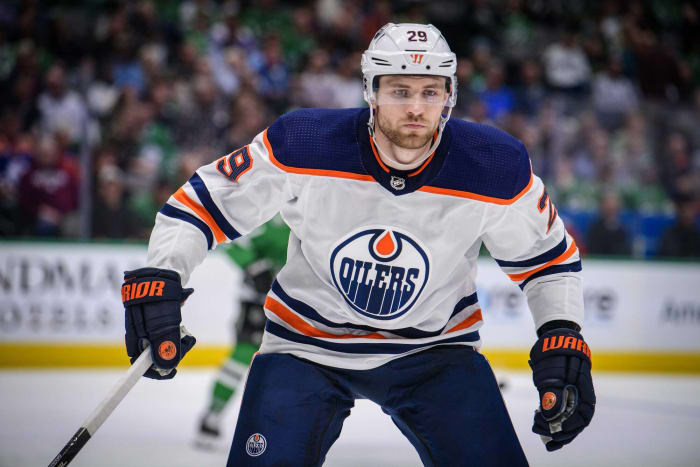
Much like how Messier was more than Gretzky’s sidekick, Draisaitl is not merely the Robin to McDavid’s Batman. Sure, the burly German benefits from his teammate’s skill, but Draisaitl won the Art Ross with 110 points when he won the Hart in the 2019-20 season. This was, of course, also the COVID-19 season, but Draisaitl got to play in 71 games before things got weird.
2020-21: Connor McDavid

The next year, McDavid said, “I’m happy for you Leon, but this is my award.” McDavid, already recipient of two Art Ross trophies, won his third with 105 points in 2021. Now, that would be impressive in a full season, but this was a campaign shortened by COVID-19. McDavid had 105 points in a mere 56 games, which is very impressive.
2021-22: Auston Matthews

In 2022, McDavid won his fourth Art Ross, but he didn’t take home his third Hart. Maybe voters realized that there would be more chances to name McDavid MVP going forward. Also, of course, some voters do love goals. Though Matthews had 106 points to McDavid’s 123, he led the NHL with 60 goals. There is something magic about that 60-goal number.
2022-23: Connor McDavid
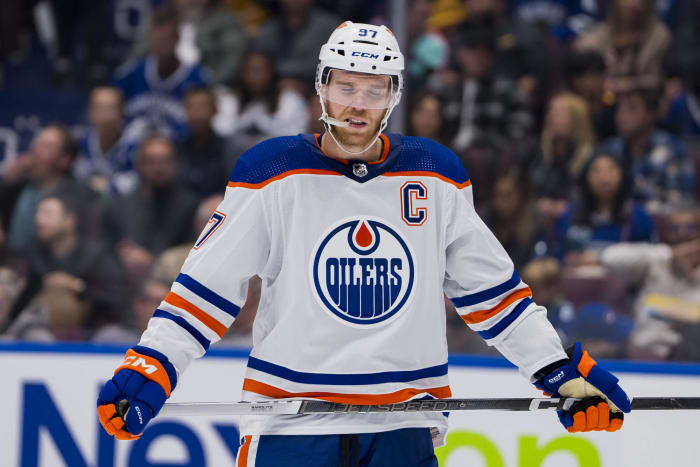
McDavid was only 26 when he won his third Hart trophy. He’s in rarified territory as is, with the chance to really solidify himself as an all-time legend of the game. In 2022-23, McDavid had maybe the best season of the expansion era not by a guy named Gretzky or Lemieux. He had 64 goals and 153 points. Only three people have ever had more points in a season (shout out to Yzerman, also in the mix). All that is left: winning the Cup.
Chris Morgan is a sports and pop culture writer and the author of the books The Comic Galaxy of Mystery Science Theater 3000 and The Ash Heap of History. You can follow him on Twitter @ChrisXMorgan.
More must-reads:
- Watch: New dad Brandon Carlo scores for Bruins
- Three reasons Stars will eliminate Avalanche in second round
- The 'NFL MVP runners-up' quiz
Breaking News
Customize Your Newsletter
 +
+
Get the latest news and rumors, customized to your favorite sports and teams. Emailed daily. Always free!
Use of this website (including any and all parts and
components) constitutes your acceptance of these
Terms of Service and Privacy Policy.

